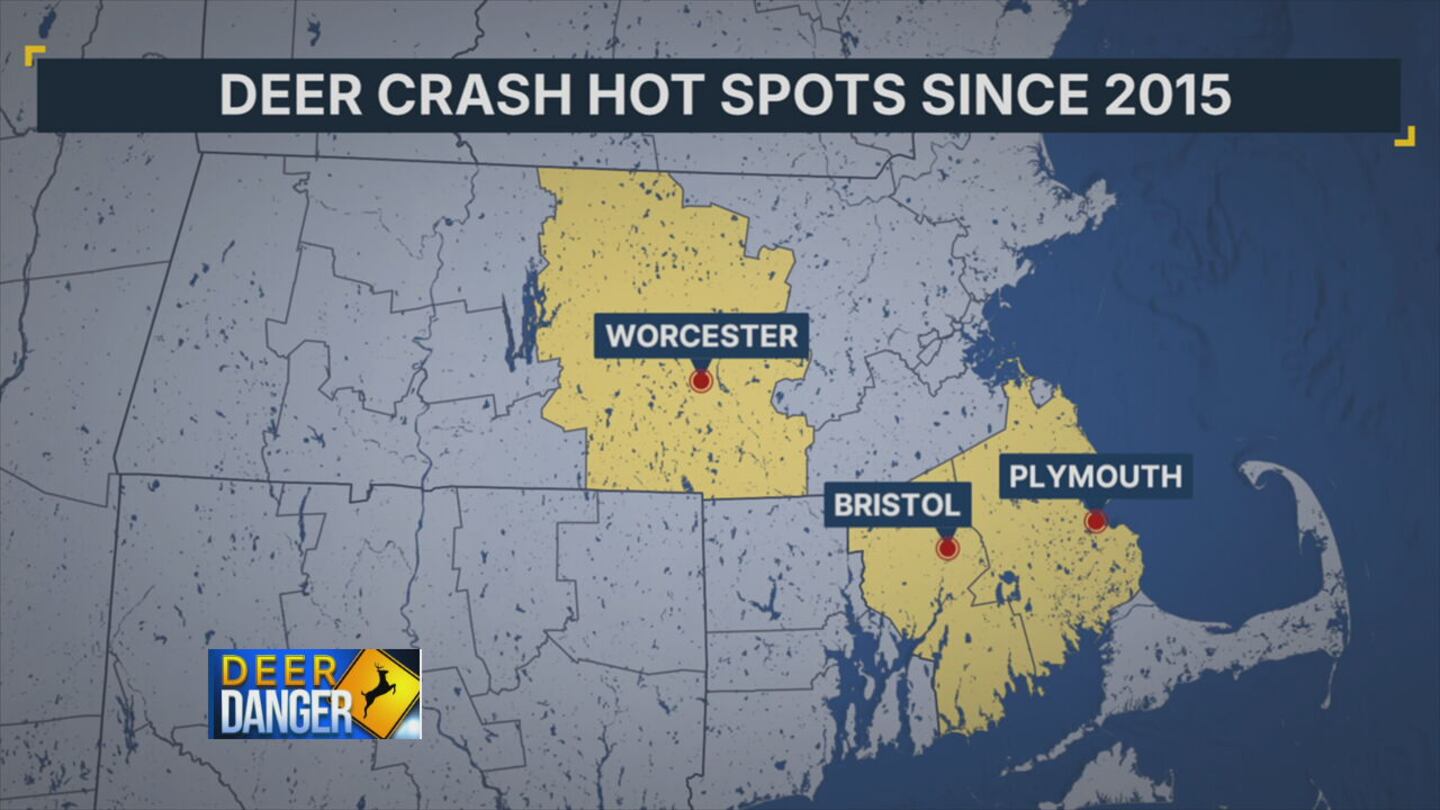November is the most dangerous month for deer-related crashes in Massachusetts, with hundreds of accidents occurring due to deer on local roads and highways.
Data from MassDOT, compiled by AAA and reviewed by Boston 25, shows deer-related accidents in Massachusetts are up 51% over the last 10 years, with 729 crashes occurring last November alone.
“Across the entire state, the deer densities are rising,” says Dr. Martin Feehan, a deer and moose biologist with Mass Wildlife.
November is the peak of mating season for deer, and thousands are on the move across New England, Feehan says.
Mass Wildlife estimates the state’s deer population using a reconstruction model that looks at densities across 15 wildlife management zones. Feehan puts the current estimate at 175,000 deer in Massachusetts, but he suspects the true number may be much higher.
“Areas that are closed to hunting aren’t being sampled,” Feehan says.
State laws prohibit hunting within 500 feet of a dwelling, which Feehan says limits where deer can be harvested, especially in parts of eastern Massachusetts. Combined with a decline in hunters, deer numbers are flourishing.
RISK TO DRIVERS
For drivers, higher deer populations mean an added danger on the roads. Michael DiMare totaled his pickup on northbound I-93 near Lawrence in 2019 when a deer crossed three lanes of traffic and jumped the median.
“It literally just appeared in front of my car,” DiMare recalled to Boston 25 News. The resulting impact deployed DiMare’s airbags, leading to burns on his arms.
It was so quick, DiMare didn’t even have time to brake. It happened “in the blink of an eye,” he said.
“It just made no sense to me,” DiMare said. “There was no potential in my brain that a deer would cross three lanes of traffic, hop over the median, and then I’d strike it in the passing lane.”
Data shared by AAA Northeast shows crashes involving deer in Massachusetts have risen almost every year in the last decade.
In 2015, there were a reported 2,354 accidents involving deer.
By 2024, the number had climbed to 3,559.
More than 1,100 drivers or passengers were hurt in the same timeframe. At least four people died.
“We have many places in Massachusetts where we’ve got prime deer habitat and we’ve got highways and roadways and a lot of folks commuting,” says Mark Schieldrop, senior spokesperson for AAA Northeast. “We’ve really got the recipe for a high number of deer crashes just based on those factors alone.”
KNOWN HOTSPOTS
Apart from AAA’s data, Boston 25 News also pulled crash statistics from Massachusetts State Police for November 2024. MSP’s data confirms hundreds of accidents in the state that month, though fewer than noted in AAA’s report.
AAA pulled its data from MassDOT’s online crash data portal, which includes local agencies. State Police could only provide data for crashes they responded to, specifically.
While no area of the state is immune, three hotspots for deer crashes emerged: Worcester County in central Massachusetts along with Plymouth and Bristol Counties to the southeast. Combined, the three counties accounted for thousands of crashes in the last decade.
Feehan says suburban communities and areas within the 495 corridor have some of the highest deer densities in the state. The highest are recorded on Martha’s Vineyard and Nantucket.
“Densities there get into the hundreds of deer per square mile,” Feehan says.
HUNTERS NEEDED
New homes, neighborhoods, and roads have long encroached on deer habitat. But a decline in the number of hunters and limits on where and when hunting can happen are also contributing to the rise in the state’s deer population – and a rise in accidents, officials say.
Mass Wildlife is working to encourage more people to take up hunting in Massachusetts. The “Share the Harvest” program allows hunters to donate venison to families in the state facing food insecurity. Since the program launched in 2022, hunters have helped distribute 60,000 meals to families in need.
Feehan says efforts are underway to extend hunting seasons, and suggests rolling back a ban on Sunday hunting could also help. He also says there are millions of acres of land in Massachusetts currently closed to hunters because of the state’s 500-foot setback rule, which especially impacts communities in eastern Mass. Reducing setbacks by 100 or 200 feet could greatly expand access for hunting.
“Folks who live kind of on those edge areas and have homes on one, two, or three acres may not be able to hunt on their own property, even with a yard of that size,” Feehan says.
State lawmakers would have to make the change, and some communities may not favor hunting closer to homes. But Feehan says it could be beneficial, and not just for drivers.
“If you had more land to hunt on, more hunters hunting, you could have more venison to help feed more people.”
Download the FREE Boston 25 News app for breaking news alerts.
Follow Boston 25 News on Facebook and Twitter. | Watch Boston 25 News NOW
©2025 Cox Media Group






